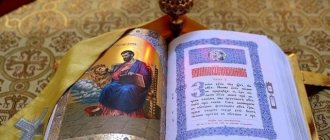Content:
“The Law of God” is the most popular textbook on the Orthodox faith for families and schools in the 20th century. The book clearly outlines the fundamentals of Orthodox Christian faith and life.
The book consists of five parts.
1. Basic concepts of the Orthodox faith.
2. Main prayers.
3. Retelling of the Old and New Testaments.
4. Creed, dogmas, commandments and sacraments.
5. Arrangement of the temple and worship.
Modern edition of the textbook. Moscow, Sretensky Monastery Publishing House, 2013
Children of first and second wave emigrants grew up separated from Orthodoxy
. In the early 50s of the 20th century, there was a need for a simple and accessible presentation of the foundations of the Orthodox faith and culture. Archpriest Seraphim Slobodskaya took on the task of compiling such a manual that is simple in presentation and at the same time comprehensive in its content.
“Sin, or evil, is a violation of the law of God; lawlessness, or in other words sin, is a violation of the will of God... All of us, people, come from Adam and Eve who sinned, and therefore we are born in a state of sin. Constantly passed on from generation to generation, sin took possession of all people and subjugated everyone. All people, some more, others less, are all sinners.”
“It is necessary to give one book containing all the fundamentals of Christian faith and life”
,” Father Seraphim wrote in the preface to the second edition of “The Law of God.” The second edition of “The Law of God” was published in 1967. Soon the book began to be published throughout the world.
All illustrations
Priest Seraphim did it himself to the “Law of God.”
The original idea
Father Seraphim was to create a multi-volume “Law of God,” but then the decision came to publish it in one volume, in the form in which it now exists.
“God created us, people, in His image and likeness - He gave us reason, free will and an immortal soul, so that, by knowing God and becoming like Him, we would become better and kinder, improve ourselves and inherit eternal blissful life with God . Therefore, the existence of man on earth has a deep meaning, a great purpose and a high purpose. There is and cannot be anything meaningless in God’s universe. And if a person lives without faith in God, not according to God’s commandments, not for a future eternal life, then the existence of such a person on earth becomes meaningless.”
"God's Law"
became a textbook for parish schools in America, was used as a guide in raising children in the family and as a self-instruction manual for adults who want to better understand the Orthodox faith.
"This is not just a textbook
The Law of God for children is a real encyclopedia of theological sciences for adults. This book should be on the table in every family after the Gospel,” said the famous theologian of the ROCOR, Archbishop Averky Taushev, at the funeral of Father Seraphim.
To the Soviet Union
“The Law of God” by Archpriest Seraphim Slobodsky came into being in the 1970s. The book was secretly copied and passed from hand to hand.
Handwritten prayers were also a common phenomenon in Soviet Russia.
In the early 1990s, The Law of God became the most popular book about the foundations of the Orthodox faith
in Russia. “The Law of God” was published in millions of copies. New editions of this book are still being published.
Gideon
From among the judges Gideon
He became famous for the fact that with a small army, with the help of God, he delivered the Jews from the enemies of the Midianites, who oppressed the Jews for seven years. The Jews had to hide from them in gorges and fortifications. Such a misfortune forced the Jews to come to their senses and turn to God. Then the merciful Lord sent them a deliverer in the person of Gideon.
One day, Gideon was preparing to flee from his enemies and was beating (threshing) wheat to stock up on bread for the road. At this time, an Angel of the Lord appeared to him and ordered him to gather an army against the enemy.
Gideon, fulfilling the command of God, began to gather an army and gathered 32 thousand soldiers. After this, Gideon turned to God with a request to give him a sign (proof) that the Lord would indeed save the people of Israel through him. Gideon prayed like this: “Lord! So I will spread shorn wool (fleece) here on the threshing floor. If there is dew only on the wool, but the whole earth is dry, then I will know that You will save Israel with my hand.”
Gideon's prayer was answered. The next day, getting up early, Gideon began to wring out the wool and squeezed a whole cup of water out of the dew-covered wool.”
But Gideon again turned to the Lord in prayer: “Lord! Don’t be angry with me if I say again: let it be dry on the wool alone, and let there be dew on the whole earth.”
God heard Gideon’s second prayer and did so that night: only the wool was dry, but there was dew all over the earth.
Then the Lord said to Gideon: “The people (armies) with you are too many; I will not deliver the Midianites into their hands, lest Israel become proud before Me and say, “My hand has saved me.” Therefore, the Lord commanded Gideon to send home everyone who was fearful and timid. And 22 thousand people returned home, and Gideon had 10 thousand people left.
The Lord again said to Gideon: “There are still many people,” and commanded Gideon to lead everyone to the water. At the direction of God, Gideon separated those who drank water, scooping it up with a handful of hands, from those who drank directly with their mouths leaning towards the water. There were three hundred people drinking water by the handful .
And the Lord said to Gideon, “With three hundred I will save you.”
Gideon took with him 300 soldiers, food supplies and a pipe, and sent the rest home.
That night God told Gideon to visit the camp of the Midianites. The Midianites and Amalekites settled in the valley in such a multitude as locusts, their camels were countless, they were as numerous as the sand on the seashore.
Gideon and his servant Terah made their way into the camp of the Midianites and heard one warrior telling another his dream, as if round barley bread was rolling through the Midianite camp, rolled towards the tent, hit it so that the tent fell, overturned and crumbled.
To this the other soldier replied: “This is nothing other than the sword of Gideon, which God will deliver into the hands of the Midianites.” Gideon was greatly encouraged.
Returning to his camp, Gideon woke up his soldiers and gave each a lamp covered with a jug and a trumpet. He divided everyone into three detachments and ordered them to surround the enemy camp and do what his detachment would do and shout: “the sword of the Lord and Gideon.”
When everyone was in place. Gideon ordered his troop to break the jars and, with lighted lamps, blow the trumpets and shout: “the sword of the Lord and of Gideon!” The other two detachments did the same.
The Midianites were attacked by such fear and horror that in great confusion and darkness they began to kill each other and finally fled.
Gideon defeated them completely and returned home victorious with enormous booty.
After this victory, the Israelites offered Gideon and his descendants royal power over themselves, but he refused and said: “Neither I will rule over you, nor my son; May the Lord rule over you."
Author-compiler:
Archpriest Seraphim Slobodskoy
(1912–1971) - clergyman of the Russian Orthodox Church Abroad, rector of the Intercession Church in Nyack near New York, icon painter, famous Orthodox theologian.
7 facts about Archpriest Seraphim Slobodsky
1. Seraphim Slobodskoy was born in 1912 near Penza into the family of a priest. The boy was named in honor of St. Seraphim of Sarov.
2. Seraphim’s father was repressed in the late 1930s. After graduating from school, Seraphim moved to Moscow, received an art education, and worked in his specialty.
3. Art education saved the captured soldier Seraphim in the German concentration camp “VI Fort”. One day he painted a portrait of a sentry, he was delighted, and from that day on the prisoner Slobodsky was settled in a separate house with the artist Semyon Podorozhny, who gave painting lessons to the camp commandant. On Sundays, Seraphim was even allowed to attend church.
4. Soldier Slobodskaya understood well that if he returned to his homeland, the Gulag would be waiting for him. He decided to stay in West Germany. In 1949, Seraphim Slobodskoy married the daughter of Prince Alexei Lopukhin, Elena. The marriage produced a daughter, Tatyana, and a son, Alexey.
5. In 1951, Seraphim took holy orders and after some time headed the community of the Intercession Parish in the city of Nyack, 45 km north of New York.
Church of the Intercession, Nyack. Photo by Steven Dolinsky
6. In 1957, the construction of the Intercession Church, led by Father Seraphim, was completed. The first edition of The Law of God was published that same year. Father wrote the book at night: during the day he supervised the construction, he himself painted frescoes on the walls of the temple and was involved in the youth camp of his parish.
Photo sergeylarin.livejournal.com
7. Father Seraphim died of sudden cardiac arrest after an evening service in 1971 and was buried in the Novo-Diveevo Convent in New York State.
Samuel
The last judge of the people of Israel was the prophet Samuel
, from the tribe of Levi.
Samuel's parents did not have children for a long time. One day, Samuel’s mother, Anna, during fervent prayer in front of the Tabernacle, made a vow to God: if she had a son, she would dedicate him to the Lord. Anna's prayer was heard, and a year later her son was born. Anna named him Samuel
, which means -
asked from God
.
When Samuel grew up, his mother brought him to the Tabernacle and gave him to the high priest Eli to serve God. High Priest Eli
was at that time also a judge of the people of Israel.
The high priest Eli had two sons, Hophni and Phinehas, who were priests at the Tabernacle, but they were vicious people, performed the service of God without reverence and corrupted the people with their bad behavior. Eli saw Samuel's piety and appointed him to serve at the Tabernacle.
Samuel always slept inside the Tabernacle, not far from where Eli slept.
One day, through a dream, Samuel heard a voice calling him: “Samuel, Samuel!”
Samuel immediately ran to Eli and said, “Here I am, you called me.”
Eli answered: “I did not call you; go back and lie down.”
Samuel went and lay down, and again the voice called to him: “Samuel, Samuel!” And a second time Samuel came to Eli, but Eli again answered that he had not called him.
When this was repeated a third time, then Eli realized that the Lord was calling the boy, and said to him: “Go back and lie down. If the voice still calls you, say: “Speak, Lord, for Your servant hears.”
Samuel lay down and again heard the voice calling him. Samuel answered as Eli taught him. Then the Lord revealed to Samuel that the whole house of Eli would perish because Eli knew how wickedly his sons were acting and did not curb them.
The next day Samuel told Eli what the Lord had told him. Eli accepted the prediction with humility.
Samuel's prediction was soon fulfilled.
The Philistines attacked the Israeli army and defeated it. Then Eli, at the request of the elders of Israel, sent the Ark of the Covenant to the camp with his sons, the priests Hophni and Phinehas. But the Ark did not help the Israelites. They were again defeated by the Philistines. Hophni and Phinehas were killed and the Ark was captured. So the Lord showed people that a holy thing will not help someone who does not respect the holy commandments of God
. Elijah, having learned that the Ark had been taken by the Philistines, fell backward from his seat and died.
The Ark of the Covenant, being a great shrine of the Lord, did not remain with the Philistines for long. God Himself taught them that their idol Dagon was broken, the inhabitants of that city had painful growths on their bodies, and mice filled their fields. The frightened Philistines placed the Ark of the Covenant on a new chariot, harnessed two young cows to it and released it from their land. The cows, not controlled by anyone, went to the land of Israel on their own. The Israelites greeted the Ark of the Covenant with great joy.
Samuel was appointed judge of the people of Israel.
. Samuel ruled the people not only as a judge, but also as a prophet of God. He convinced the Jews to destroy all the pagan idols they had, pray to God for forgiveness, and fast. All the people repented and said: “We have sinned before the Lord.” Through the prayer of Samuel, the Lord delivered the Jews from the power of the Philistines. Samuel was strict and fair and enjoyed great respect and love from everyone. He ruled the people for forty years. In his old age, he transferred power to his two sons, who took gifts and judged unfairly. The impatient Jews began to ask Samuel to install a king over them, like other nations. Samuel tried to convince the people to remain under the previous government, but to no avail. Then Samuel prayed to the Lord, and the Lord said to him: “Listen to the voice of the people in everything that they say to you; for they have not rejected you, but they have rejected Me, so that I should not reign over them.” Then the Lord told him to warn the Jews that the king would force all the people to serve himself, take for himself the best lands, the best property of the people, and they would have to give everything to the king. But the people did not heed Samuel’s warnings and said: “No, let the king be over us, and we will be like other nations.”
Saul as king
, pouring sacred oil (liquid vegetable oil) on his head, and then the Holy Spirit descended on Saul, and Saul received from above the power to rule the people.
Note
: see the Bible - “The Book of Judges of Israel” and “1st Book of Kings”, ch.
1-10
, 1-16.










